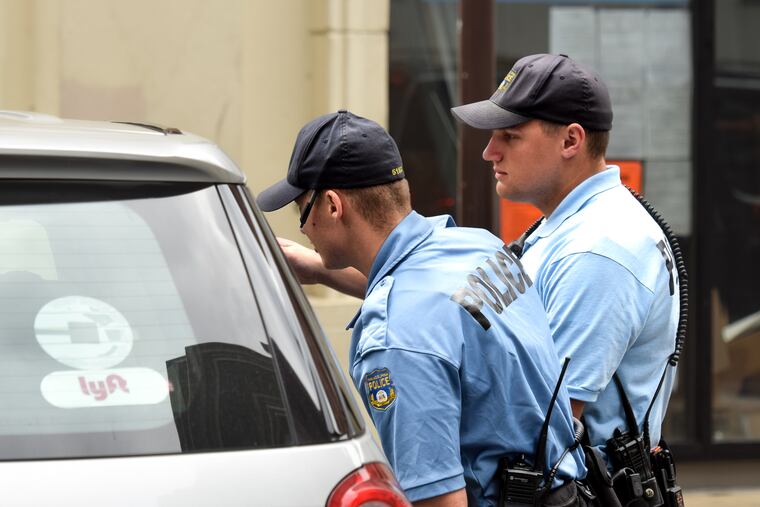Philly voters can choose to create traffic enforcement officers in Tuesday’s primary election
The ballot question is designed to free police officers from traffic enforcement duties.

Voters can decide Tuesday whether Philadelphia’s congestion problems warrant the creation of a new class of law officer dedicated to traffic enforcement.
The primary election will include a ballot question asking voters to amend the City Charter to create “public safety officers.” They would not be sworn police officers, would not be armed, and would not have arrest powers, but would assist in traffic control, including having authority to issue some citations, said City Council President Darrell L. Clarke, who has pushed the initiative.
The officers would answer to the Managing Director’s Office, Clarke said, which would deploy them as needed. Center City congestion was the impetus for creating the position, but Clarke said the officers also could be called on to assist building inspectors and the Health Department.
Only registered Democrats and Republicans can participate in the party primaries for elected offices, but any registered voter can vote on ballot questions.
Other proposed measures would change the charter to: use gender-neutral language for City Council and its members; make permanent the Office of Immigrant Affairs, created by executive order in 2016; and urge the state legislature to raise the minimum wage to $15 an hour or let Philadelphia set the wage within the city.
Philadelphia’s traffic has steadily worsened over the last decade, with a boom in e-commerce deliveries, a growing population, and ride-share vehicles.
>>READ MORE: Bike lanes, speed cameras, and traffic enforcement: Philly City Council moves ahead on safe streets issues
The congestion is more than an inconvenience. Public transportation particularly has suffered. As buses get slower — in some parts of the city a person on foot can move faster than a SEPTA bus — riders abandon transit for their own cars or ride-share vehicles, which adds to the problem. SEPTA last year reported its lowest bus ridership in more than a decade, and officials are concerned the trend will ultimately harm the system’s ability to provide cheap, comprehensive travel.
“What I hope is it’s really more for the areas experiencing a lot of chronic illegal activity,” said Sarah Clark Stuart, executive director of the Bicycle Coalition of Greater Philadelphia.
Issues such as blocking the box at intersections and illegal parking in bike lanes are among the violations the new officers might focus on.
But details remain vague, including the cost. Clarke anticipates about 100 new officers, but said that he didn’t want to be specific about what enforcement powers they might have. The officers would be assigned to curtail behavior from drivers, cyclists, and pedestrians that contribute to congestion, he has said.
If the amendment is approved, the city would spend the next year working out the details. It’s paramount to free sworn police from traffic enforcement, Clarke said.
“The traffic has calmed in some key congested areas, but it’s simply as a result of the deployment of police officers,” Clarke said. “Police should be doing police work.”
Opponents have raised questions about how the new class of officers would be paid, and whether it would be wise to put unarmed people in potentially contentious situations.
>>READ MORE: Philly’s still stuck in traffic. Here are 5 fixes from around the world.
“They should have the power of arrest if necessary, they should be trained in firearms,” said Al Taubenberger, a City Council member who voted against putting the question on Tuesday’s ballot. “This is where danger occurs with police officers.”
The city’s police union is also opposed, saying the creation of a new class of officer would violate state law that grants traffic enforcement powers to sworn police officers. The Fraternal Order of Police said it would file a complaint with the state labor board.
Public safety officers exist in other cities, including New York, which has served as an inspiration for Philadelphia’s initiative, and Clarke said he is confident the officers would be legal.